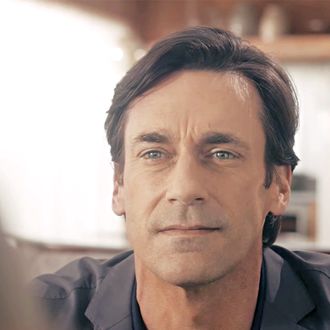
The sci-fi chamber drama Marjorie Prime is exquisite — beautiful, intense, shivering with empathy. It opens with a gentle, affectionate conversation between the ailing 86-year-old Marjorie (Lois Smith) and her husband, Walter (Jon Hamm), who died 15 years earlier — presumably looking much older than the dark, slender man who represents the Walter whom Marjorie first met. This Walter is not Marjorie’s fantasy but a hologram — a “Prime” — that begins as a blank slate but gradually absorbs information to the point where it can reminisce, share stories, and respond to questions — eventually “remembering” more than humans, whose memories are malleable and transient. Primes seem to have been invented to give comfort to the bereaved, the old, the lonely — to function as virtual-reality opiates. But they’re so open, shiny-eyed, and nonjudgmental that people want to say everything to them. They want to say what they couldn’t say to those who can no longer hear them. This isn’t escapism. It’s an intensification of the past, both longed for and hellish.
The director Michael Almereyda adapted Marjorie Prime from a 2014 play by Jordan Harrison that had runs at L.A.’s Mark Taper Forum and New York’s Playwrights Horizons (both productions starring Lois Smith). It has barely been “opened out,” remaining a series of conversations between family members and the Primes that replace the dead. But there isn’t a second that feels stage-bound. The film is set in an airy, immaculate beach house, the gray ocean visible through the windows and sliding doors, unchanging even as the cast of humans dwindles. Against this semblance of order are emotions that could rip the place apart—in another kind of play or film, that is, maybe one by Tracy Letts or Sam Shepard. The violence in Marjorie Prime is turned inward.
Marjorie is the fulcrum of Marjorie Prime but not its dramatic center. She has more than a touch of dementia. She’s on her way out. It’s her daughter, Tess (Geena Davis), who feels the instability of the world most acutely, and Tess’s husband, Jon (Tim Robbins), who feels the instability of Tess. A dead child figures in the plot, as a dead child figures in so many — probably too many — plots, but here the child is used to mysterious and tantalizing effect. He was Tess’s older brother, and Marjorie has almost expunged his memory. He’s absent from the stories she tells Walter Prime. The question is whether the boy can be written out of the past altogether or whether the fact of him will be signaled by the hole where he should be.
Marjorie Prime is not the kind of movie in which we learn who invented the Prime technology or how much it costs. It’s sci-fi in the service of exploring our inner lives, a string-quartet variation on Charlie Kaufman’s symphonic Eternal Sunshine of the Spotless Mind, in which some memories can be altered but essential ones keep seeping back. As Walter Prime, Jon Hamm begins with the affect of movie and TV androids — Data from Star Trek: the Next Generation or Michael Fassbender’s screw-loose David in the new Alien films. But as he gazes on Marjorie, we begin to pick up something deeper than clinical scrutiny. I thought of the Chekhov seen by writers like Janet Malcolm through the lens of Christianity, as someone who registered every human flaw but finally released his characters from judgment.
Hamm’s beatific mien also evokes the machines in the final section of A.I.
Artificial Intelligence that give the beseeching David a final day of comfort and joy. People are ephemeral and disappear, but the Primes retain those human memories, or a form of them. The movie is nominally sci-fi, but the impulse behind it seems philosophical and religious — and consoling.
The actors are marvelous. Lois Smith is unquenchably girlish and bright, her unruly white tresses ending in patches of dark brown, as if Marjorie has just let go of youthful vanity and, as a result, become younger. Tim Robbins captures the despair of the desperate, impotent do-gooder. Geena Davis is the biggest surprise. Gone are the blurty mannerisms of her youth — in their place is a plainness that makes Tess seem heartbreakingly undefended.
I’ve known Almereyda for many years and have struggled to come to terms with his work for nearly as long. Made on tiny budgets, his films are dense with detail and can seem a tad overintellectualized. But in his last few films — Experimenter, the current documentary Escapes, and now Marjorie Prime — his formal devices bring us closer to his subjects instead of distancing us. The world of Marjorie Prime is alive with reflections and refractions, with imperfect copies of people who could be seen — as a result of their selective memories — as imperfect copies of themselves. It’s a transcendently lovely work — a ghost sonata.
*This article appears in the August 7, 2017, issue of New York Magazine.


